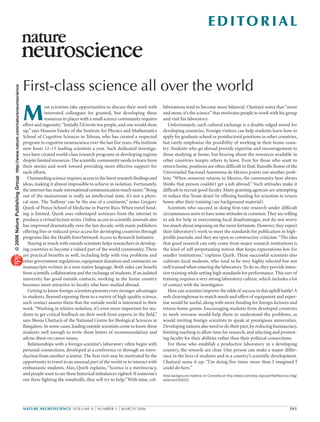More Related Content
Similar to First class science all over the world
Similar to First class science all over the world (20)
First class science all over the world
- 1. EDITORIAL
First-class science all over the world
NATURE NEUROSCIENCE VOLUME 9 | NUMBER 3 | MARCH 2006 293
laborations tend to become more bilateral. Chattarji notes that “more
and more,it’s the science”that motivates people to work with his group
and visit his laboratory.
Unfortunately, such cultural exchange is a double-edged sword for
developing countries. Foreign visitors can help students learn how to
apply for graduate school or postdoctoral positions in other countries,
but rarely emphasize the possibility of working in their home coun-
try. Students who go abroad provide expertise and encouragement to
those studying at home, but hearing about the resources available in
other countries tempts others to leave. Even for those who want to
return home, positions are often difficult to find. Ranulfo Romo of the
Universidad Nacional Autonoma de Mexico points out another prob-
lem: “When someone returns to Mexico, the community here always
thinks that person couldn’t get a job abroad.” Such attitudes make it
difficult to recruit good faculty.Many granting agencies are attempting
to reduce this ‘brain drain’ by offering funding for scientists to return
home after their training (see background material).
Scientists who succeed in doing first-rate research under difficult
circumstances seem to have some attitudes in common.They are willing
to ask for help in overcoming local disadvantages, and do not worry
too much about imposing on the more fortunate.However,they expect
their laboratory’s work to meet the standards for publication in high-
profile journals, and they are open to constructive criticism.“The idea
that good research can only come from major research institutions is
the kind of self-perpetuating notion that keeps expectations low for
smaller institutions,” explains Quirk. These successful scientists also
cultivate local students, who tend to be very highly selected but not
well trained when entering the laboratory.To do so,they provide inten-
sive training while setting high standards for performance. This sort of
training requires a very strong laboratory culture, which includes a lot
of contact with the investigator.
How can scientists improve the odds of success in this uphill battle?A
web clearinghouse to match needs and offers of equipment and exper-
tise would be useful, along with more funding for foreign lectures and
return-home grants. Encouraging students from developed countries
to work overseas would help them to understand the problems, as
would inviting foreign scientists to speak at prestigious universities.
Developing nations also need to do their part,by reducing bureaucracy,
limiting teaching to allow time for research, and selecting and promot-
ing faculty for their abilities rather than their political connections.
For those who establish a productive laboratory in a developing
country, the rewards are clear. One person can make a major differ-
ence in the lives of students and in a country’s scientific development.
Chattarji sums it up: “I’m doing five times more than I imagined I
could do here.”
View background material on Connotea at http://www.connotea.org/user/NatNeurosci/tag/
editorial200603.
M
ost scientists take opportunities to discuss their work with
interested colleagues for granted, but developing these
resources in places with a small science community requires
effort and ingenuity.“Initially I’d invite ten people,and one would show
up,” says Hossein Esteky of the Institute for Physics and Mathematics
School of Cognitive Sciences in Tehran, who has created a respected
program in cognitive neuroscience over the last five years. His institute
now hosts 12–15 leading scientists a year. Such dedicated investiga-
tors have created world-class research programs in developing regions
despite limited resources.The scientific community needs to learn from
their stories and work toward providing more effective support for
such efforts.
Outstanding science requires access to the latest research findings and
ideas, making it almost impossible to achieve in isolation. Fortunately,
the internet has made international communication much easier.“Being
out of the mainstream is really an intellectual state; it’s not a physi-
cal state. The ‘hallway’ can be the size of a continent,” notes Gregory
Quirk of Ponce School of Medicine in Puerto Rico. When travel fund-
ing is limited, Quirk uses videotaped seminars from the internet to
produce a virtual lecture series. Online access to scientific journals also
has improved dramatically over the last decade, with many publishers
offering free or reduced-price access for developing countries through
programs like the Health InterNetwork Access to Research Initiative.
Staying in touch with outside scientists helps researchers in develop-
ing countries to become a valued part of the world community. There
are practical benefits as well, including help with visa problems and
other government regulations, equipment donation and comments on
manuscripts written in a non-native language. Both sides can benefit
from scientific collaboration and the exchange of students.If an isolated
university has good outside contacts, working in the home country
becomes more attractive to faculty who have studied abroad.
Getting to know foreign scientists presents even stronger advantages
to students. Beyond exposing them to a variety of high-quality science,
such contact assures them that the outside world is interested in their
work.“Working in relative isolation, it’s even more important for stu-
dents to get critical feedback on their work from experts in the field,”
says Shona Chattarji of the National Centre for Biological Sciences in
Bangalore.In some cases,leading outside scientists come to know these
students well enough to write them letters of recommendation and
advise them on career issues.
Relationships with a foreign scientist’s laboratory often begin with
personal connections, developed at a conference or through an intro-
duction from another scientist. The first visit may be motivated by the
opportunity to travel to an unusual part of the world or to interact with
enthusiastic students. Also, Quirk explains, “Science is a meritocracy,
and people want to see these historical imbalances righted.If someone’s
out there fighting the windmills, they will try to help.”With time, col-
©2006NaturePublishingGrouphttp://www.nature.com/natureneuroscience
